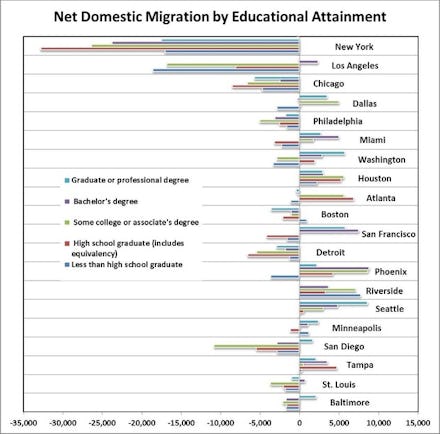The Most Popular Cities for College Graduates Aren't New York or L.A.

The news: According to CityLab's Richard Florida, attracting an educated workforce is "the" key factor that will determine which metro areas succeed and which falter in America's newfound knowledge economy.
So with a team from the Martin Prosperity Institute, Florida was able to put together this chart analyzing "net domestic migration" of workers from one metro to another over one year spanning 2011–2012. The map doesn't reflect larger trends, but it does capture which cities are currently seeing either growth or reduction in their skilled workforce. These metros should do particularly well in the years ahead as talent and money flows through their local economies.
Wow: Traditional meccas for young, highly educated people like New York and Los Angeles are still growing in population (mainly through increased immigration), but are now seeing a net loss of Americans of all education levels.
Instead, the cities that are attracting a coveted educated workforce are "knowledge and tech hubs like San Francisco, Austin, Seattle and Denver, and also Sun Belt metros like Phoenix, Charlotte and Miami." In particular, "Seattle, San Francisco, D.C., Denver, San Jose, Austin and Portland, as well as the banking hub of Charlotte" are attracting Americans with professional and graduate degrees.
Overall, large metros (especially ones that cost a lot to live and work in) have seen their share of educated workers grow, even as lower-class workers get priced out. San Francisco; Los Angeles; Washington, D.C.; and Miami, for example, all saw a net reduction in less-educated workers. Meanwhile, the cities that saw the biggest influx of workers with just a high school diploma were all in Sun Belt states, mainly with thriving tourist and/or service economies.
Other takeaways: Larger, wealthier metros tend to attract the most college grads. And they're also particularly drawn to ones with concentrations of high-tech and venture capital firms. No surprises there. They also seem to value cultural hotspots with large numbers of artists and creatives, as well as cities with a lot of diversity and tolerance. The highest correlation was with LGBT populations, further emphasizing the role a progressive social atmosphere plays in attracting the well-educated.
There's a clear process of reverse brain drain going on in some metropolitan areas. According to this survey, the less-educated are being priced out of many cities. That's a result backed up by high levels of gentrification in knowledge and tech centers across the country.